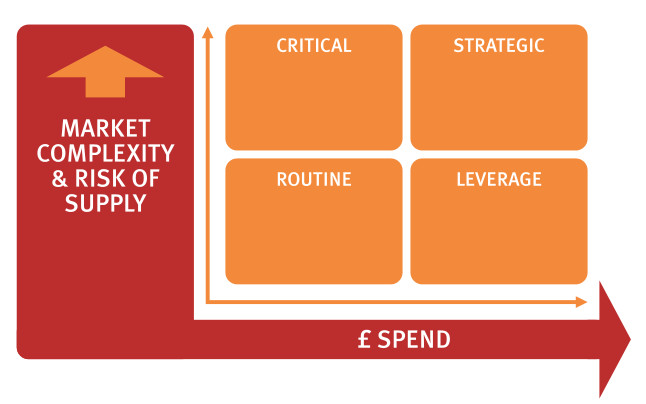When you buy anything for a business, you have as much responsibility for the bottom line as the Sales team.
Sales teams in most organisations receive rigorous and ongoing training in negotiation, sales techniques and relationship building. This gives them an edge when negotiating with most businesses.
We think it’s time to redress the balance and give the people who buy stuff for businesses the same sort of skill set that sales people have.
This will have a dramatic effect on the bottom line. One group of buyers I was with recently had responsibility for over £200 million annual spend. Between the 12 of them they had a total of 3 days negotiation training. They made the cost of their Negotiation Skills training back within a few days of the end of the course by negotiating a better deal with a supplier.
This model shows how we need to have a different approach to buying different items.
If you are buying things with a low value and plenty of suppliers – such as stationery, you don’t need to spend a lot of time planning and negotiating, check the cheapest supplier who can supply what you need when you want it and buy it from them. This is just a routine transaction.
Items with a higher cost, but with a lot of suppliers, such as IT equipment puts you in a strong position so negotiate hard. I heard of a company recently with over 300 employees (all with computers) who allow each user to buy their own PCs when they are needed – which leads to individuals buying from suppliers like PC world. As a company, if they had a strategic approach to buying IT equipment, they could save a fortune. How many suppliers would like to supply over 300 PCs on a regular basis?
Items which are vital to your process, with a low cost, but very few suppliers are in the ‘critical’ quadrant because the power is very much in the hands of the supplier. This means you have to negotiate carefully to maintain supply while keeping the costs as low as possible.
Some items may be very expensive, be critical to your process and have very few, or one supplier. If, for example, you make cars, your engine supplier would fit into this category and you need to have a much more strategic, long term and collaborative approach to working with them than you would with a stationery supplier.
Have a look at your list of suppliers and plot them on the model above. You will soon realise that a ‘one size fits all’ approach to negotiating will not be effective.
We can help you improve your negotiations and help you get a better deal, adding to your organisation’s profit.

